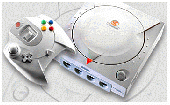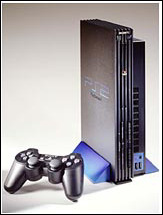|
Sega's gaming gambit
|
 |
May 18, 2001: 9:17 a.m. ET
Game maker counts on titles for Xbox, PlayStation, GameCube to spur profit
By Staff Writer John Chartier
|
NEW YORK (CNNfn) - Now that it has stopped producing the Dreamcast video game console, Sega Corp. is focused on becoming the dominant game maker, an increasingly important role in a shrinking field of box producers.
Game console makers can have the sleekest, most sophisticated machines, but no one will want them if there are no fun games to play, analysts and industry executives said.
And that's where Japan's Sega Corp. sees its new niche.
Wall Street suspects that with its long history of producing such game hits as "Sonic the Hedgehog" and a popular line of sports games for the Dreamcast, Sega can thrive in its new role as a game developer for Sony's (SNE: Research, Estimates) PlayStation 2, Nintendo's GameCube and Microsoft's Xbox.
Sony, Nintendo and Microsoft all produce their own games, but they also rely in large part on so-called "third party" game developers for strong titles.

|
|
|
Sega stopped making the Dreamcast in March (Courtesy: Sega) | |
Redwood City, Calif.-based Electronic Arts (ERTS: Research, Estimates) recognized that need and became the top game producer to date. Its sales are approaching the $20 billion mark. Other smaller but veteran producers such as Activision (ATVI: Research, Estimates), Acclaim (AKLM: Research, Estimates) and Midway (MWY: Research, Estimates) dot the field as well.
But analysts are beginning to take note of Sega.
"Sega is one of the handful of companies that can aspire to be one of the global leaders in game software," said John Taylor, an analyst with Arcadia Investments. "They can be a king maker for a platform."
The company already has trimmed its workforce with more cuts expected and has announced agreements to produce games for the PlayStation 2, GameCube, and Xbox.
Most of the cuts will come from corporate headquarters, the company said. Its 10 studios, which employ 1,200 people, will largely be unaffected. The studios, nine of which are in Japan, are the heart and sole of Sega's formidable game developing talent, which is now being brought to bear on the entire console market.
| |

|
|
Sonic the Hedgehog is one of Sega's most popular games (Courtesy: Sega) | |
"We're trying to focus upon why Sega is different now and why it will be more successful than in the past," Sega of America President Peter Moore said. "One word we came up with is "unleashed". We have been focused for decades on building our hardware business first, then selling our software. Now our development talent is unleashed."
Other analysts agree with Moore's view.
"The opportunity to profit from the creative talent and the icons that Sega has already created such as 'Sonic' are very strong," Burnham Securities Analyst David Leibowitz said. "The arrangements with Microsoft for the Xbox and other projects underway could result in a meaningful turnaround in the company's fortunes."
Sega agreed to produce four titles for PlayStation 2 and an undisclosed number of games for Nintendo's GameCube. But the biggest software agreement it has announced so far is 11 games for Microsoft's Xbox.
That could prove troublesome if the Xbox flops. Though a successful, deep-pocketed company, Microsoft is a gaming newcomer with little experience going up against such well-established icons as Nintendo and PlayStation.
| |

|
|
| |
|
|
| |
They can be a king maker for a platform.
|
|
| |
|
|
| |

|
|
| |
|
|
| |
John Taylor
Analyst, Arcadia Investments
Talking about Sega's new role as a video game maker |
|
Moore is optimistic about the future of Xbox, but said the company's hopes are not dependent solely on its success.
"I don't think it's wise to bet against Microsoft in anything they do. I know that (CEO Bill) Gates is personally involved in the success of this project," Moore said. "My job is to make sure we're not overexposed on one particular platform, but that we are ready when a platform does explode."
Still, a big part of the Xbox's success will stem from the kinds of games Sega produces for it.
"Our whole approach to the Xbox is that we're choosing partners who are leaders from a manufacturing perspective such as Electronic Arts, Activision, Tsunami, Midway and Sega," said John O'Rourke, director of marketing for the Xbox. "Having Sega bring 11 titles to Xbox is certainly very exciting for us. It sort of validates our vision. It really is a great signal to the industry and gamers around the world."
Moore stresses that the key to success as a game maker is being able to produce for everyone.
"What helps us a lot is going multi-platform. When you have one platform, you have a single title for a platform. Now that we've gone multi-platform, we can develop Sega sports titles and sell them for the GameCube, Xbox, and PlayStation 2," Moore said. "Our marketing dollars are spread much more evenly and volume builds. The marketing costs will decrease per title."
| |

|
|
The Xbox is Microsoft's first game console (Courtesy: Microsoft) | |
Online gaming is a developing field in which Sega also hopes to take a leading role. Last year it launched SegaNet, its Web site devoted exclusively to online gaming for Dreamcast users.
The Xbox, PS2 and GameCube will all feature online gaming capabilities.
"We are great believers in online gaming, and this is why I believe Microsoft has a great advantage," Moore said. "They have announced their broadband strategy for the future."
A dream deferred
That outlook is a far cry from what Wall Street was saying about Sega a year ago.
Sega's Dreamcast, the first ever 128-bit console introduced in 1999, featured a trove of popular games including "Sonic," "Crazy Taxi," and a basket of sports titles like "NFL 2K1." It sold at a faster rate in its first year than Sony Corp.'s PlayStation did when it was released in 1995, Moore said.
But the company simply could not keep pace with Nintendo, whose "64" unit boasted such popular titles as Pokemon and Mario. And then Sony introduced PlayStation 2 in 2000, which despite a chip shortage that delayed shipments, still enjoyed incredibly strong demand.
The cash and profit dried up quickly at Sega until, in January, the company finally announced it would stop making game consoles and instead focus squarely on developing games.
The company said it will continue to produce games for the Dreamcast and continue SegaNet even though it no longer will produce new consoles.
Part of the problem stemmed from the fact that developing and building video game consoles is a money-losing proposition from the start, and Sega simply did not have the marketing dollars to maintain sales of the otherwise popular machine.
| |

|
|
Dreamcast couldn't keep pace with Sony's PlayStation 2 (Courtesy: Sony) | |
"The lesson we learned was never to get into the hardware business again," Moore said. "Sega had incurred an incredible amount of losses over the last few years trying to develop a next generation console. The unfortunate part of getting into the hardware market is that it's a very expensive undertaking. All the hardware manufacturers are incurring losses."
Then in March, Sega's 74-year-old Chairman Isao Okawa died of heart failure in a Tokyo hospital. Although Okawa had been sick with cancer and had not played an active role in the company for some time, his death was disheartening to employees.
But the company quickly refocused its goals. As part of its restructuring last month, Sega said it would trim 28 percent of its work force in an attempt to become profitable by next March. The company said on April 19 that it would continue reducing its work force from a high of 1,081 in January to about 700 by March 2002, all at its Tokyo headquarters.
Although he regrets the layoffs, Moore believes Sega is well positioned for its new role.
"From our point of view the slate is relatively clean," Moore said, adding that Okawa gave nearly $700 million back to the company to help get it out of debt before he died. "We've been in the software business for a quarter of a century. We've got teams that have been together for a long time. These guys salivate over this stuff. They're hardcore gamers. Now they're kind of unleashed." 
|
|
|
|
|
 |

|

